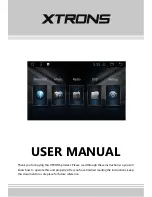
27
ENGLISH
CONNECTION _______________________________
Method 2: Standard HDMI
•
If your TV is not HDMI ARC-compliant, connect
your soundbar to the TV through a standard
HDMI connection.
Use an HDMI cable (included) to connect the
soundbar's HDMI OUT socket to the TV’s HDMI IN
socket.
Use an HDMI cable (included) to connect the
soundbar's HDMI IN (1 or 2) socket to your ex-
ternal devices (e.g. games consoles, DVD players
and blu ray).
Use the OPTICAL Socket
•
Remove the protective cap of the OPTICAL
socket, then connect an OPTICAL cable
(included) to the TV’s OPTICAL OUT socket and
the OPTICAL socket on the unit.
Use the COAXIAL Socket
•
You also can use the COAXIAL cable (not
included) to connect the TV's COAXIAL OUT
socket and COAXIAL socket on the unit.
• Tip:
The unit may not be able to decode all
digital audio formats from the input source.
In this case, the unit will mute. This is NOT a
defect. Ensure that the audio setting of the input
source (e.g. TV, game console, DVD player, etc.)
is set to PCM or Dolby Digital (Refer to the user
manual of the input source device for its audio
setting details) with HDMI / OPTICAL / COAXIAL
input.
Use the AUX Socket
•
Use a RCA to 3.5mm audio cable (not included)
to connect the TV’s audio output sockets to the
AUX socket on the unit.
•
Use a 3.5mm to 3.5mm audio cable (included)
to connect the TV’s or external audio device
headphone socket to the AUX socket on the unit.
Connect Power
Risk of product damage!
•
Ensure that the power supply voltage
corresponds to the voltage printed on the back
or the underside of the unit.
•
Before connecting the AC power cord, ensure
you have completed all other connections.
Soundbar
Connect the mains cable to the AC~ socket of the
main unit and then into a mains socket.
















































